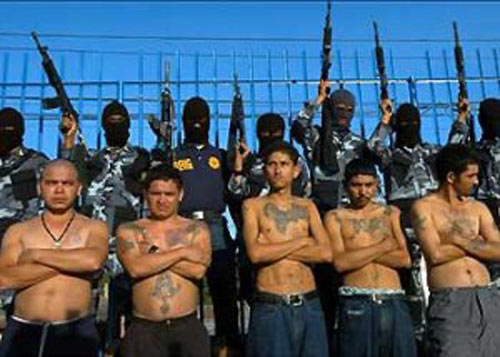After Mèrida: Page 2 of 2
existing drug cartels, which leads to the introduction of new “brands”, some of them may try to use this trick for the sake of their safety. But the Mexican drug mafia must remember that the USA not only have no sympathy towards the rebels of any kind, but as a rule view them as an additional cause for military intervention. Due to the abovementioned statements of Secretary of State Hillary Clinton this trick will be even beneficial for Washington. Now, the U.S. Government, looking for the enemy symbol for a new anti-drug strategy (similar to Osama bin Laden, who symbolized the international terrorism) has to be satisfied only with Los Zetas, a group of former army and police task force officers, who are most similar to the guerillas in comparison with other drug traffickers, and to whom the media and authorities pay special attention.

At the same time, Washington rules out the possibility of the full-scale humanitarian intervention in Mexico. Taking into consideration the history of embittered relations between the countries, the public opinion on both sides of the border must be carefully prepared even for the minimal involvement of the USA in the fight against drug cartels in Mexico. This is the second cause of the media campaign, carried out by the U.S. Department of State at the beginning of 2011. It seems that the two countries managed to achieve some success in this regard. For example, after two officers of the U.S. Immigration Service in San Luis Potosì were attacked and one of them killed, the U.S. special services got the unprecedented freedom for the investigation on the Mexican territory since the Camarena case. The success of this form of cooperation was consolidated in April, 2011, with the joint operation during the crisis in Tamaulipas, where the mass grave of 145 victims of Los Zetas drug cartel was found.
As a conclusion, it should be noted that, though having failed in the fight against the drug trafficking, the Mèrida Initiative has become the first step made by the USA and Mexico towards each other, the step that was so necessary after the diplomatic failures of the 20th century. Some external signs make it possible to think that the two countries have already negotiated the gradual flexible and potentially unlimited physical involvement of the USA in the Mexican conflict. And it’s most likely that these agreements were encouraged not even by the threat for the security of both countries, posed by the drug war, but by the risks of restoration of authoritarianism and taking power by the leftists in Mexico on the wave of the crisis. This can be confirmed by the fact that the social component of the fight against drugs at last is taken into consideration, but only within the Mèrida Initiative that is being implemented too slowly. Thus, it seems like both governments, apparently in anticipation of elections, have decided to bet on the special operations, arrests and other activities that draw attention, but are not always effective. If this plan proves to be successful and the National Action Party retains power, it will be possible to think about the full-scale anti-drug strategy.






